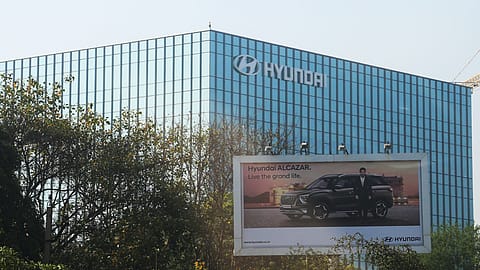Hyundai to hike car prices from January 2024
The carmaker announced the price increase owing to rising input costs, adverse exchange rate and an increase in commodity prices, among other reasons.

Hyundai Motor India Limited (HMIL) on Thursday said it will increase the prices of its models from January 1, 2024. The company announced the price increase owing to rising input costs, adverse exchange rate and an increase in commodity prices, amongst other reasons.
"At Hyundai Motor India, we always try to absorb the cost escalations to the extent possible and ensure continuous customer delight. However, it has now become imperative to pass on some portion of the rising input cost to the market through a minor price increase," the carmaker says.
Hyundai further adds it will continue to make consistent internal efforts to minimise future price impact to customers.
This comes at a time when Tata Motors has overtaken India's second-largest carmaker Hyundai in terms of retail sales in November 2023. The Tata Group company sold 53,539 units in November, cornering a 14.85% market share as compared to Hyundai's 49,716 units with a 13.79% market share, according to data released by the Federation of Automobile Dealers Associations (FADA). Maruti Suzuki remains India's largest carmaker with 41.6% market share.
Meanwhile, Tata Motors is also mulling a price increase next year. "We are considering a price hike across our passenger and electric vehicles in January 2024. The extent of the hike and exact details will be announced in few weeks," a Tata Motors Spokesperson said.
Auto retail sales created history in November with 28.54 lakh vehicles getting sold, surpassing the previous high of 25.69 lakh units in March 2020 when automakers transitioned from BS-4 to BS-6 emission norms, according to FADA.
In its near-term outlook, FADA says the PV sector shows potential for growth with year-end offers and discounts expected to stimulate sales, along with an improved vehicle supply and new product launches. "However, the market faces hurdles in terms of a preference for 2024 manufactured vehicles and a notable slowdown in demand and bookings post festivities," the auto dealers' association says.
Recommended Stories
The current PV inventory, still above 60 days, underscores the need for OEMs to strategically reduce dispatches of slow-moving vehicles, especially in the entry-level category, it says. Historically, it is recognised that holding inventory beyond 30 days starts to erode dealer profitability as the financial burden is intensified by the high interest costs of inventory funding from financial institutions, FADA cautions.
In the near term, the two-wheeler category is poised to benefit from a liquidity boost, particularly in agricultural regions and the ongoing marriage season, with around 38 lakh marriages expected to drive vehicle sales. However, challenges persist as severe weather conditions impacting rabi cultivation might affect rural incomes, potentially dampening sales, the auto dealers’ lobby says. In contrast, the CV category is expected to see some recovery, driven by renewed business activities post-elections and positive movements in key sectors like cement and coal.